Photo: Danny Clinch
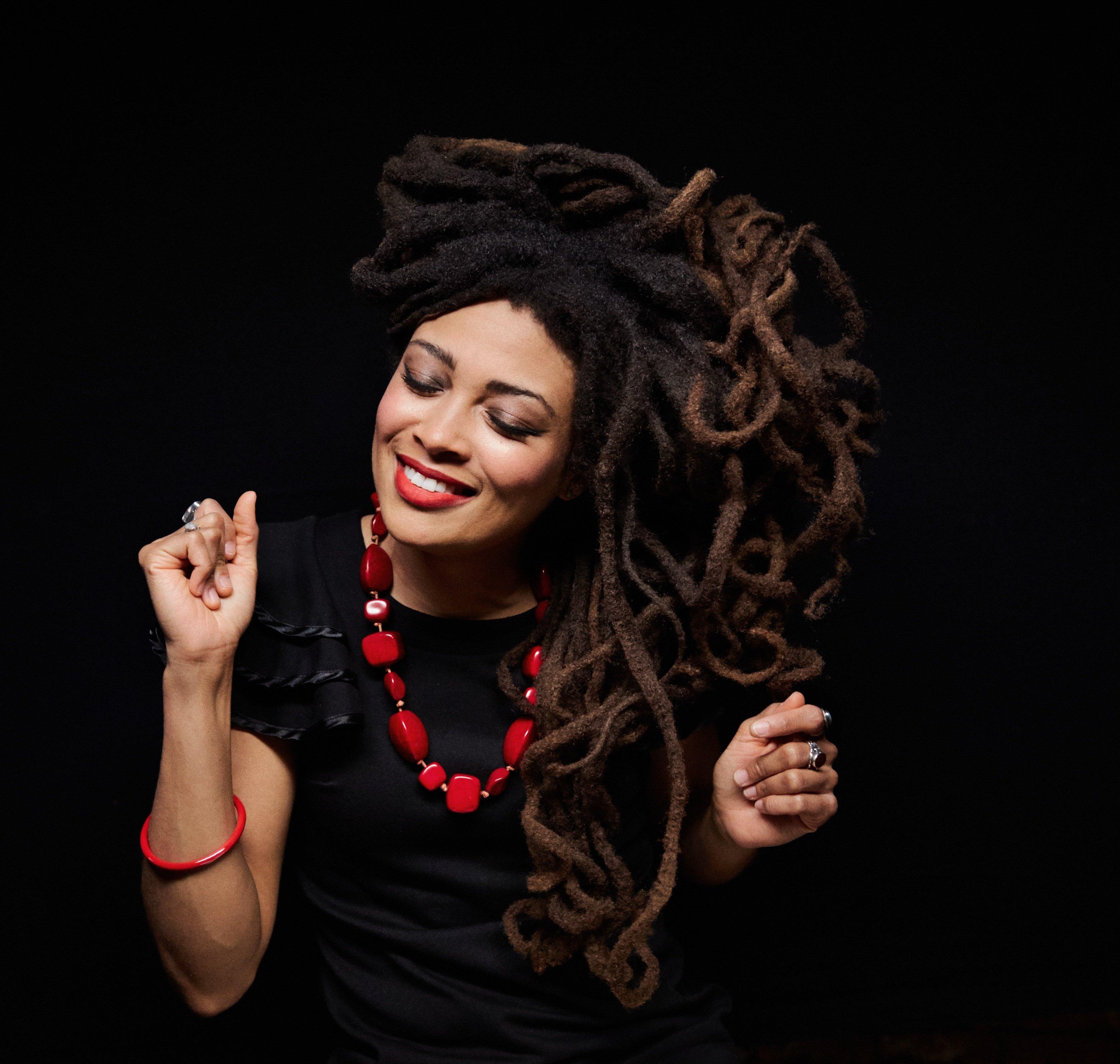
Valerie June
news
Valerie June & Other Black Artists Call For Voter Mobilization With Upcoming Livestream Benefit Concert
The star-studded virtual show will take place on Sun., Oct. 18 in partnership with City Winery, with proceeds supporting Fair Fight and Movement Voter Project's Black-Led Organizing Fund
Americana songstress Valerie June is curating a stacked livestream concert to encourage voting in the upcoming election and benefit two organizations fighting voter suppression. Voice Your Vote will take place on Sun., Oct. 18 in partnership with City Winery and is inspired by June's "Young, Gifted and Black" Spotify playlist and the spirit of Nina Simone (the playlist's name is a nod to her groundbreaking 1969 song).
Watch: Exclusive: Valerie June On Newport Folk & "Astral Plane"
June will perform during the virtual event, along with the Black Pumas, Brittany Howard, Chastity Brown, Deva Mahal, Jon Batiste, Kandace Springs, Amythyst Kiah, Leyla McCalla, Lizz Wright, Rhiannon Giddens with the Resistance Revival Chorus, and others. More artists will be announced soon.
According to the press release, "Voice Your Vote will feature an array of Black artists, musicians, and poets, who will share their art and use their voice to uplift efforts to mobilize voting and stop voter suppression, a tactic commonly used to primarily target Black and brown communities. Proceeds from the event will be distributed to Fair Fight and Movement Voter Project's Black-Led Organizing Fund, two organizations working to support fair elections and grassroots voter mobilization around the country."
"This year, 2020, has unveiled so many wounds that we have the power to change by voting," June wrote in the release. "From systemic racism to climate change, it can feel overwhelming to look at the countless issues we're facing in the world today and to decide which ones to focus on changing, but collectively showing up in record numbers to cast our ballots is one of the simplest ways we can raise our voices. I believe that by voting in this year's election we have the power to end the year on a high note, so voice your vote."
The event will be aired on music streaming platform Mandolin on Oct. 18 at 3:00 p.m. PT / 5:00 p.m. ET / 6:00 p.m. ET. Tickets are available on City Winery's website for $15.
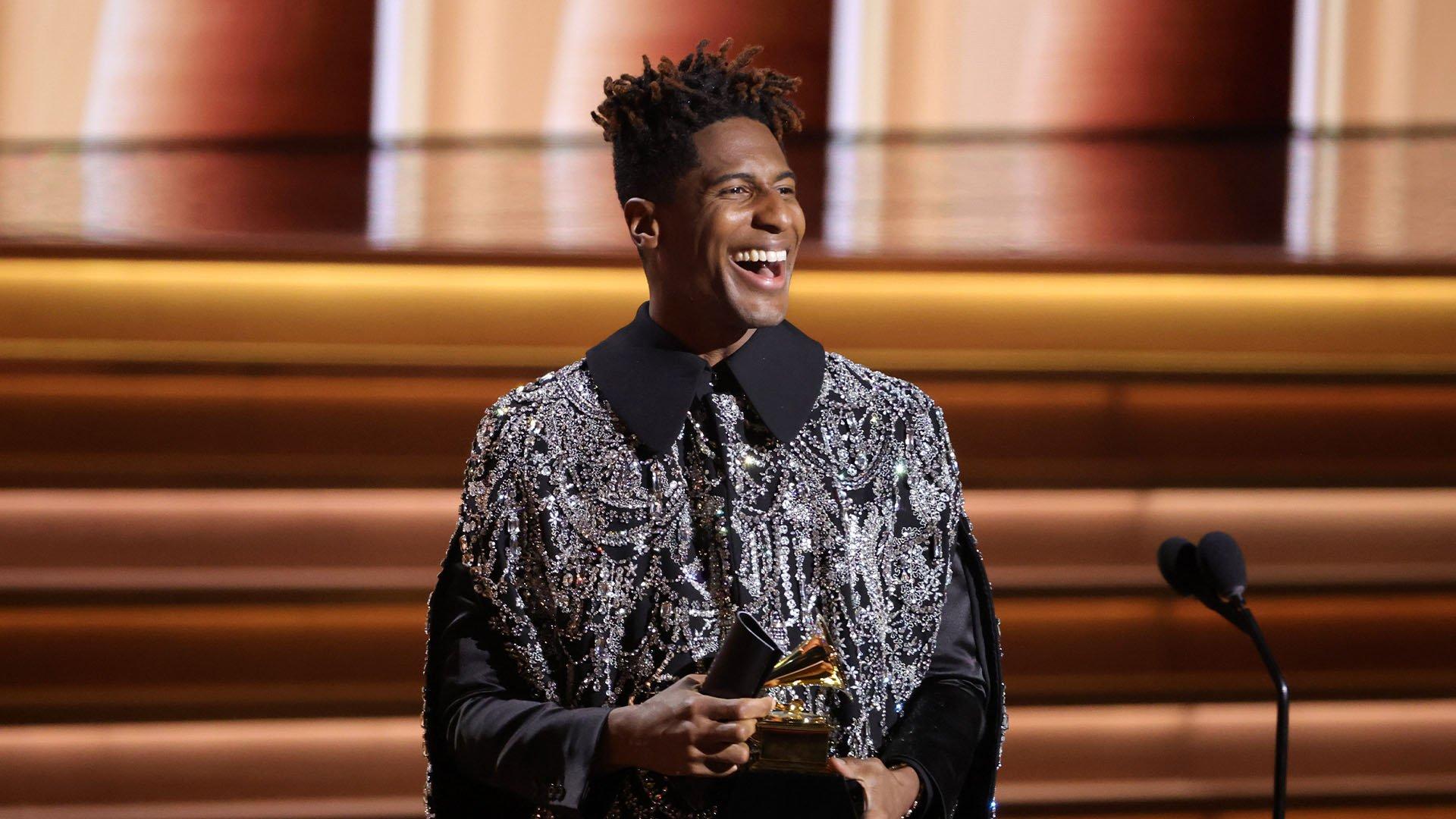
Photo: Matt Winkelmeyer/Getty Images
video
GRAMMY Rewind: Watch Jon Batiste’s Encouraging Speech For His 2022 Album Of The Year Win For 'We Are'
Jon Batiste accepts the Album Of The Year award for We Are, a win that he dedicated to "real artists, real musicians."
Jon Batiste walked into the 2022 GRAMMYs with a whopping 11 nominations, making him the most recognized artist of the evening. By the end of the night, he received five GRAMMYs for Best American Roots Performance, Best American Roots Song, Best Score Soundtrack For Visual Media, Best Music Video, and the highly coveted Album Of The Year.
In this episode of GRAMMY Rewind, watch Batiste take the stage to accept the award for Album Of The Year for his sixth studio album, We Are
Batiste began his praises by acknowledging God: "I just put my head down and work on the craft every day. I love music, he said. "I've been playing since I was a little boy. It's more than entertainment for me — it's a spiritual practice." He also thanked the "many people that went into making this album," including his grandfather, nephew, father, and executive producer, Ryan Lynn.
"This [award] is for real artists, real musicians. Let's just keep going. Be you! That's it. I love you even if I don't know you," Batiste cheered.
Press play on the video above to hear Jon Batiste's complete acceptance speech and check back to GRAMMY.com for more new episodes of GRAMMY Rewind.
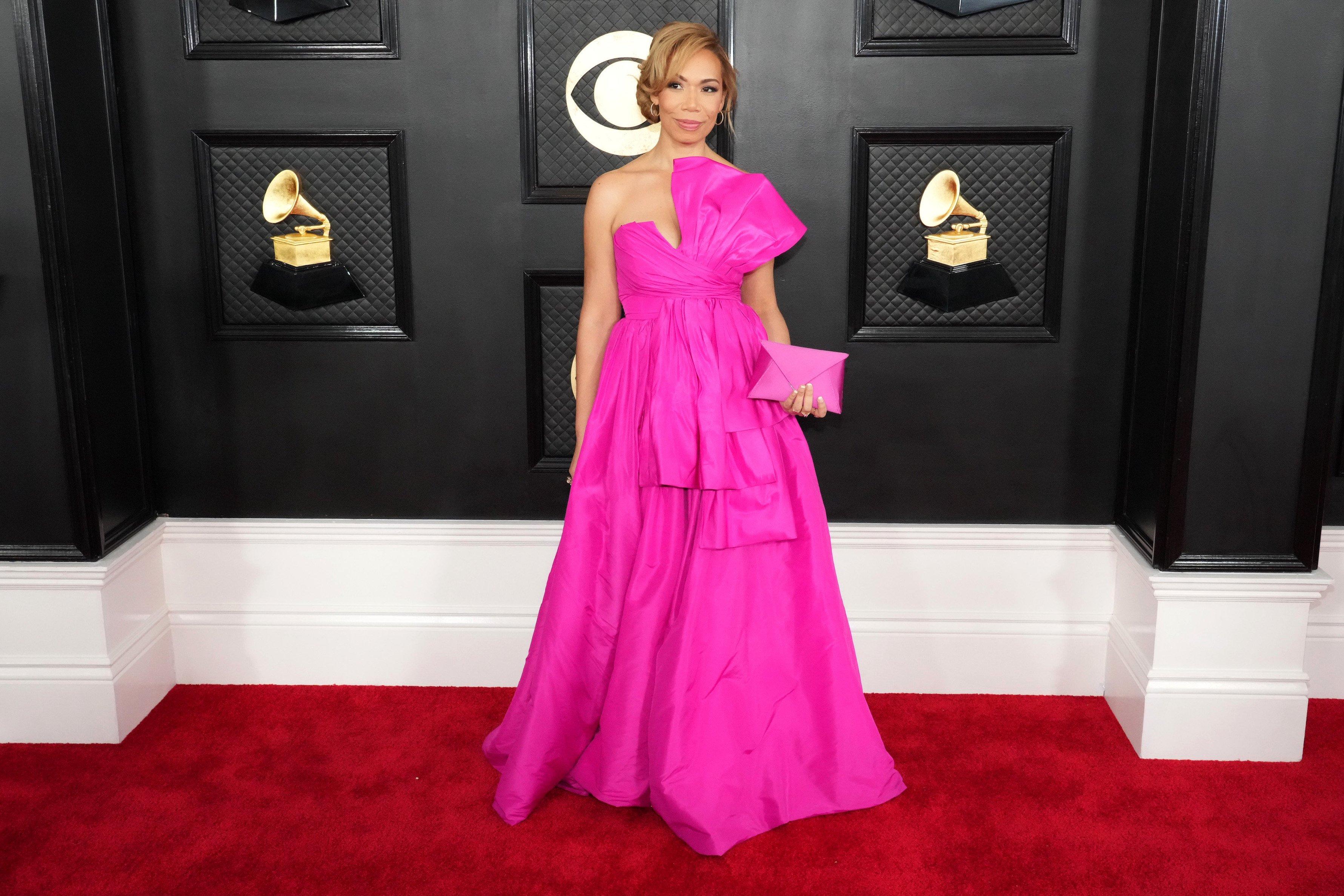
Photo: Jeff Kravitz/FilmMagic
video
Where Do You Keep Your GRAMMY?: Autumn Rowe Revisits Her Unexpected Album Of The Year Win With Jon Batiste
Acclaimed songwriter Autumn Rowe reveals the inspirational location where her Album Of The Year golden gramophone resides, and details the "really funny way" she first met Jon Batiste.
Ever since Autumn Rowe won a GRAMMY in 2022, it's been her biggest motivation. That's why the musical multi-hyphenate keeps the award nestled in her writing room — to keep her creative juices flowing.
"It reminds me that anything is possible," she says in the latest episode of Where Do You Keep Your GRAMMY?
Rowe won her first-ever career GRAMMY in 2022 with an Album Of The Year award for Jon Batiste's We Are. "It was very stressful," she recalls with a laugh.
"Right before they announced Album Of The Year, the pressure started getting to me," Rowe explains. "Album Of The Year is the biggest possible award you can win. So, I'm like, 'We didn't win any of these [categories], how are we going to win the biggest award?"
The win also taught her one unforgettable, valuable lesson: "We matter. The music matters. Everything matters. We just have to create it. If there isn't space for it, we have to make space for it. Don't wait for something to open."
Rowe says she grew up "super dirt poor" and never even had the opportunity to watch the awards ceremony on television. "To be a GRAMMY winner means it is possible for everyone," she declares.
Press play on the video above to learn more about the backstory of Autumn Rowe's Album Of The Year award, and remember to check back to GRAMMY.com for more new episodes of Where Do You Keep Your GRAMMY?
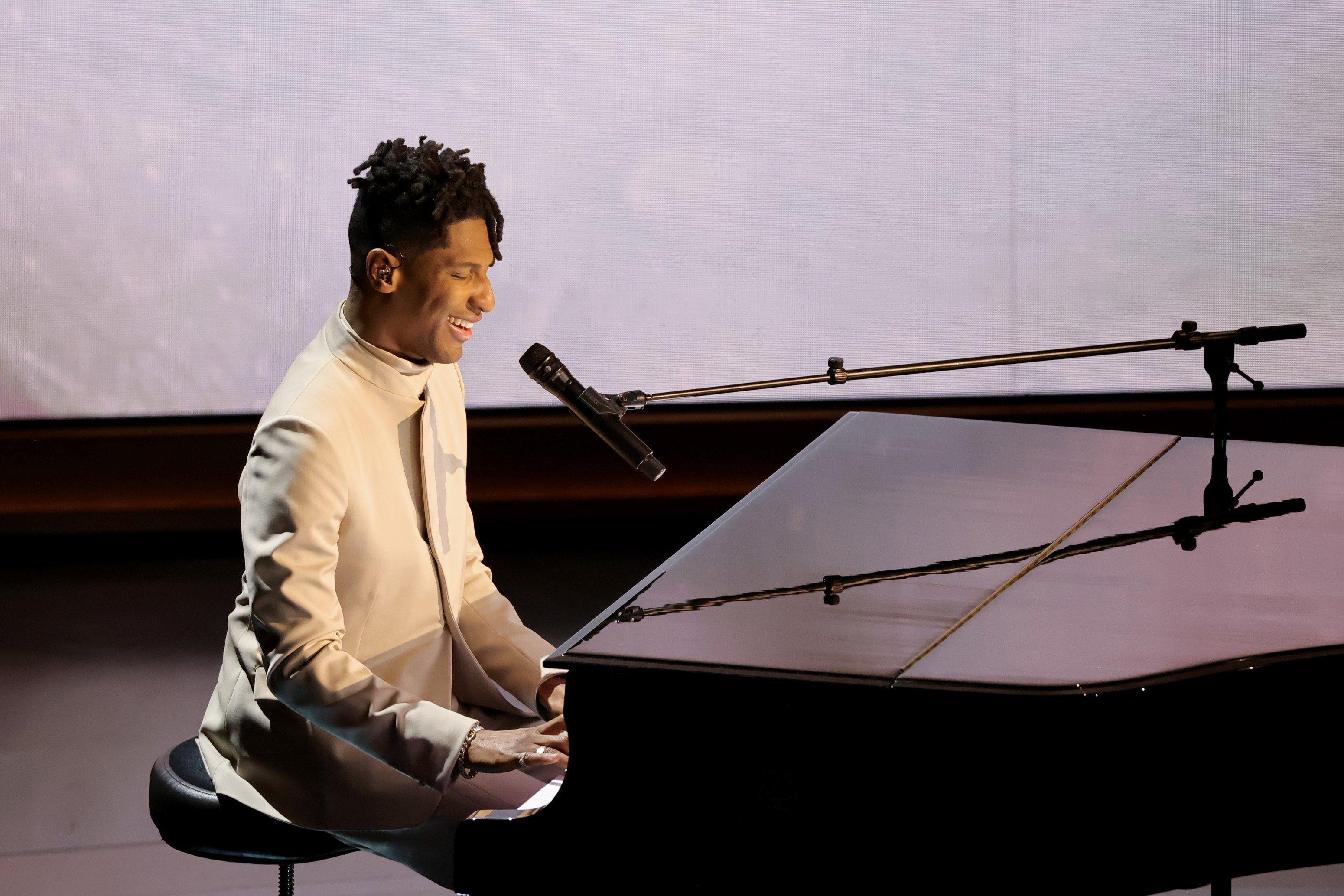
Photo: Kevin Winter/Getty Images
video
2024 Oscars: Watch Jon Batiste Perform A Poignant Rendition Of "It Never Went Away" From The Documentary Film 'American Symphony'
At the 2024 Academy Awards, five-time GRAMMY winner Jon Batiste performed a soul-nourishing version of "It Never Went Away" from ‘American Symphony,’ the acclaimed documentary film about his and wife Suleika Jaouad’s personal and creative lives.
At the 2024 Oscars on March 10, five-time GRAMMY winner and 20-time nominee Jon Batiste took the stage for a scintillating version of his co-write with Dan Wilson, "It Never Went Away."
For said performance, the multimedia phenom kept the proceedings spare and probing, letting his iridescent piano and singular pipes do the heavy lifting. Watch it above.
"It never went away/Every time I see your face," Batiste sang, in a commensurately understated, off-white stage outfit and backdrop. "The feeling's just the same/ It's never goin' away."
"It Never Went Away" was featured in the acclaimed 2023 documentary American Symphony, about his and his wife author Suleika Jaouad's personal and creative development — under the spectre of cancer and an impending debut at Carnegie Hall, of the symphony of the same name.
2024 Oscars: Watch Performances & Highlights
2024 Oscars: Watch Billie Eilish And FINNEAS Perform A Heartrending Version Of "What Was I Made For?" From The Motion Picture 'Barbie'
2024 Oscars: Watch Ryan Gosling And Mark Ronson Perform A Soaring, Hilarious Version Of "I'm Just Ken" From The Motion Picture 'Barbie'
2024 Oscars Red Carpet: Music Icons & Artists Shine Including Billie Eilish, Mark Ronson, Danielle Brooks & More
2024 Oscars: Billie Eilish and FINNEAS Win Best Original Song For "What Was I Made For?" From The Motion Picture 'Barbie'
2024 Oscars: Watch Becky G Perform "The Fire Inside" From The 2023 Comedy-Drama ‘Flamin’ Hot’
2024 Oscar Nominees Who Have Won A GRAMMY: Billie Eilish, Martin Scorsese & More
2024 Oscars: Watch Jon Batiste Perform A Poignant Rendition Of "It Never Went Away" From The Documentary Film 'American Symphony'
2024 Oscars: Ludwig Goransson's Masterful Composition for 'Oppenheimer' Wins Best Original Score
2024 Oscars: Watch Scott George and the Osage Singers Perform "Wahzhazhe (A Song For My People)" From 'Killers Of The Flower Moon'
'The Last Repair Shop' Filmmakers Share Behind-The-Scenes Stories About Oscar-Winning Documentary
How Afrobeats Star Bobi Wine Took On Uganda’s Dictatorship
"It was very complicated from a producing point of view to navigate the puzzle of Jon's insane life, and then trying to find our way into the hospital, and then back out again, and back in again," American Symphony director Matthew Heineman said last year at a live interview covered by GRAMMY.com.
In the same conversation Heineman aptly described the overall process as reflecting "the symphony of life that we witnessed over the past year."
Keep checking this space for more updates on the 2024 Oscars — including GRAMMY winners and nominees who are featured during the big night!
Inside American Symphony: 5 Revelations About The Jon Batiste Documentary
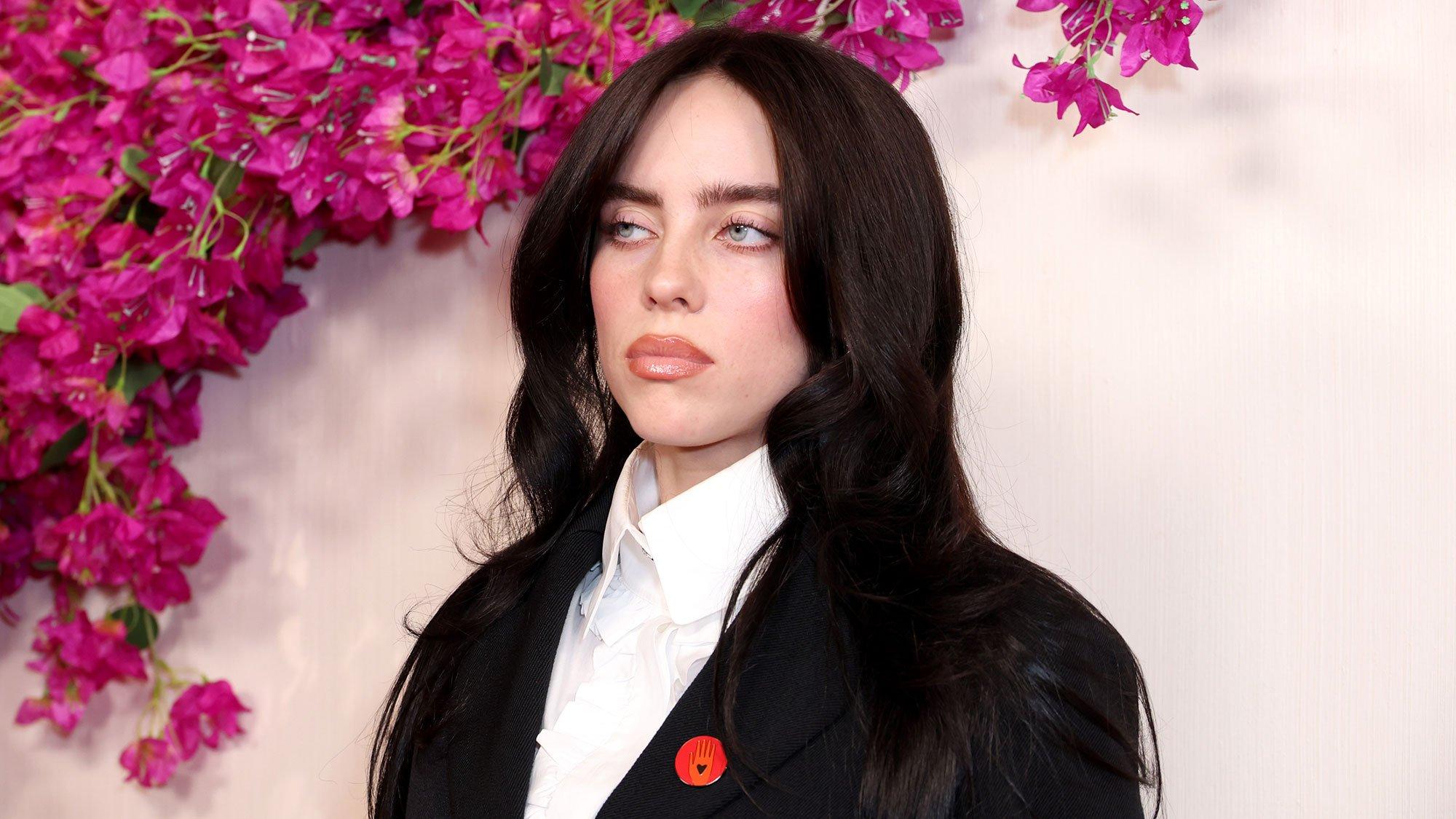
Photo: JC Olivera/Getty Images
news
2024 Oscars Red Carpet: Music Icons & Artists Shine Including Billie Eilish, Mark Ronson, Danielle Brooks & More
Visit the intersection of music and movies with a spotlight on the musical talents dazzling the red carpet at the Oscars. Billie Eilish, Danielle Brooks, and more show the creativity and style these multi-talented stars bring to Hollywood's biggest night.
Tonight, the red carpet becomes a runway that blends the art of fashion with the magic of cinema and sound.
The intersection of music and film has never been more luminous than at this year's Oscars, where numerous GRAMMY-winning artists including Billie Eilish, Jon Batiste, and Bradley Cooper are not just attending but are nominated for their contributions to the silver screen.
From enchanting melodies that tugged at our heartstrings to groundbreaking scores that redefined movie moments, these artists have already left an indelible mark on the music industry. Tonight, they grace the Oscars red carpet, showcasing not only their unparalleled talent but also their unique fashion sensibilities.
Take a closer look at these multifaceted talents and their journey from the GRAMMYs to the 2024 Oscars.
2024 Oscars: Watch Performances & Highlights
2024 Oscars: Watch Billie Eilish And FINNEAS Perform A Heartrending Version Of "What Was I Made For?" From The Motion Picture 'Barbie'
2024 Oscars: Watch Ryan Gosling And Mark Ronson Perform A Soaring, Hilarious Version Of "I'm Just Ken" From The Motion Picture 'Barbie'
2024 Oscars Red Carpet: Music Icons & Artists Shine Including Billie Eilish, Mark Ronson, Danielle Brooks & More
2024 Oscars: Billie Eilish and FINNEAS Win Best Original Song For "What Was I Made For?" From The Motion Picture 'Barbie'
2024 Oscars: Watch Becky G Perform "The Fire Inside" From The 2023 Comedy-Drama ‘Flamin’ Hot’
2024 Oscar Nominees Who Have Won A GRAMMY: Billie Eilish, Martin Scorsese & More
2024 Oscars: Watch Jon Batiste Perform A Poignant Rendition Of "It Never Went Away" From The Documentary Film 'American Symphony'
2024 Oscars: Ludwig Goransson's Masterful Composition for 'Oppenheimer' Wins Best Original Score
2024 Oscars: Watch Scott George and the Osage Singers Perform "Wahzhazhe (A Song For My People)" From 'Killers Of The Flower Moon'
'The Last Repair Shop' Filmmakers Share Behind-The-Scenes Stories About Oscar-Winning Documentary
How Afrobeats Star Bobi Wine Took On Uganda’s Dictatorship
Billie Eilish
Nominated for: Best Original Song, "What Was I Made For?" from Barbie
Billie Eilish, the alt-pop sensation with nine GRAMMY wins, brings her unique style to the Oscars wearing a tweed schoolgirl look from Chanel. At this year's Academy Awards, Eilish is nominated for the hauntingly beautiful "What Was I Made For?" [From The Motion Picture *Barbie*], the same track that won two GRAMMYs, for Song Of The Year and Best Song Written For Visual Media, at the 2024 GRAMMYs.
*Photo: JC Olivera/Getty Images*
Finneas O'Connell
Nominated for: Best Original Song, "What Was I Made For?" with Billie Eilish
Finneas O'Connell, the mind behind many of sister Billie Eilish’s hits and a 10-time GRAMMY winner in his own right, appears tonight in an ensemble that's as sleek as his production style. Nominated for the poignant "What Was I Made For?," he exudes confidence and creativity, showcasing the depth of his artistic vision.
*Photo: JC Olivera/Getty Images*
Jon Batiste
Nominated for: Best Original Song, "It Never Went Away" from American Symphony
Jon Batiste, a vision of grace on the red carpet in a monochromatic burgundy suit, brings the same passion to his music that won him five GRAMMYs and 19 nominations, including his Album Of The Year win for 2021's We Are.
Tonight, he's recognized for his soul-stirring "It Never Went Away", a testament to his versatility and depth as an artist. He won his first Oscar in 2021 for Best Original Score with Atticus Ross and Trent Reznor for their work together on Pixar's Soul.
*Photo:* Kevin Mazur/Getty Images
Mark Ronson
**Nominated for: Best Original Song, "I'm Just Ken" [From The Motion Picture Barbie]
Mark Ronson, the GRAMMY-winning producer known for hits like "Uptown Funk" and his work on Amy Winehouse's seminal Back to Black, brings well-suited sophistication to the red carpet. As an eight time GRAMMY winner, Ronson won his first Oscar award for Best Original Song in 2021 for "Shallow" for A Star is Born starring Lady Gaga and Bradley Cooper.
***Photo: Kevin Mazur/Getty Images***
Ludwig Göransson
Nominated for: Best Original Score, Oppenheimer
Ludwig Göransson, took home the Oscar for Best Original Score with a win for Oppenheimer. Known for his innovative soundscapes, Göransson's attire tonight — a satin-lapel tuxedo with wide pants and Cartier jewels — is a harmonious blend of classic and contemporary, much like his music.
*Photo: John Shearer/WireImage/Getty Images*
Bradley Cooper
Nominated for: Best Actor, Best Original Screenplay, Maestro
Bradley Cooper, presents a masterclass in red carpet fashion in a double-breasted tie-less tux with turquoise buttons and boot cut suit pants. A two-time GRAMMY winner for A Star Is Born in 2019, Cooper's transformation into Leonard Bernstein in Maestro is both a critical and stylistic triumph. Tonight, his attire is as meticulously curated as his performance, with a nod to the classical elegance befitting one of the most legendary conductors of all-time.
***Photo: Kevin Mazur/Getty Images***
Danielle Brooks
Nominated for: Best Supporting Actress, The Color Purple
Danielle Brooks dazzles in a black corseted gown with silver embellishments, a diamond necklace, and silver toned jewelry that speaks to her vibrant and powerful portrayal of Sofia in The Color Purple. A GRAMMY winner in 2017 for Best Musical Theater Album for her work in the Broadway revival, Brooks now shines on Oscars Sunday in an ensemble that is a tribute to Sofia's strength, resilience, and grace.
*Photo: Mike Coppola/Getty Images*
Diane Warren
Nominated for: Best Original Song, "The Fire Inside" from Flamin' Hot
Diane Warren, whose pen has graced many an iconic ballad, steps onto the red carpet in a "Flamin' Hot" look that echoes her lyrical genius. Nominated once again for her songwriting prowess, Warren's attire tonight is a nod to the fiery Becky G track she's nominated for tonight.
Warren has received 15 GRAMMY nominations through her career and a win for "Because You Loved Me" (Celine Dion, from Up, Close and Personal) which took home Best Song Written Specifically for a Motion Picture or for Television in 1997.
*Photo:* Rodin Eckenroth/Getty Images
Ariana Grande
Ariana Grande stepped onto the red carpet just days after the release of her album Eternal Sunshine in a custom Glinda-pink Giambattista Valli gown. Grande presented awards for Best Original Song and Best Original Score with Wicked co-star, Cynthia Erivo at the 2024 Oscars.
*Photo: Rodin Eckenroth/Getty Images*
Cynthia Erivo
Cynthia Erivo graced the red carpet in an emerald green Louis Vuitton look with voluminous leather ruffles. Erivo presented awards for Best Original Song and Best Original Score with Wicked co-star, Ariana Grande at the 2024 Oscars.
*Photo: Rodin Eckenroth/Getty Images*
Hailey Steinfeld
Nominated: Best Animated Feature, Spider-Man: Across the Spider-Verse
Hailey Steinfeld showed up to the 2024 Oscars ready to put on a show. The actress and singer wore a couture Elie Saab gown from the Spring/Summer 2024 collection in light blue with butterfly cape sleeves and a pleated skirt, accentuated by metallic appliqués adorning the bodice and wrists of the sleeves.
*Photo: Jeff Kravitz/FilmMagic/GettyImages *
Tia Carrere
Tia Carrere attends the 2024 Oscars red carpet. Carrere is a two-time GRAMMY winner for Best Hawaiian Music Album.
***Photo: Rodin Eckenroth/Getty Images***
Slash
Slash, the lead guitarist for Guns N' Roses assisted Ryan Gosling and Mark Ronson with a performance of 'I'm Just Ken' at the 2024 Oscars.
*Photo by Jeff Kravitz/FilmMagic*
2024 Oscar Nominees Who Have Won A GRAMMY: Billie Eilish, Martin Scorsese & More
